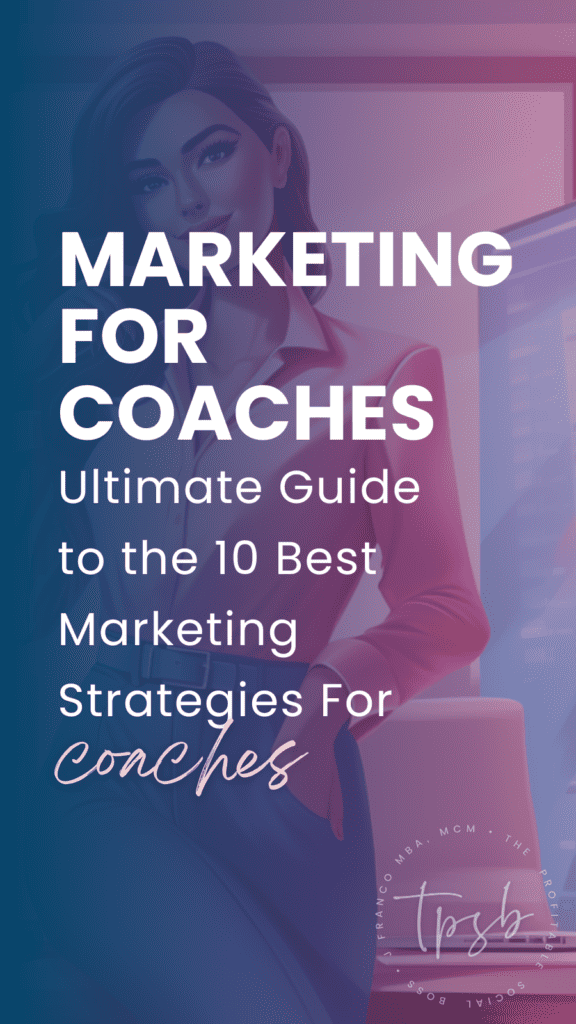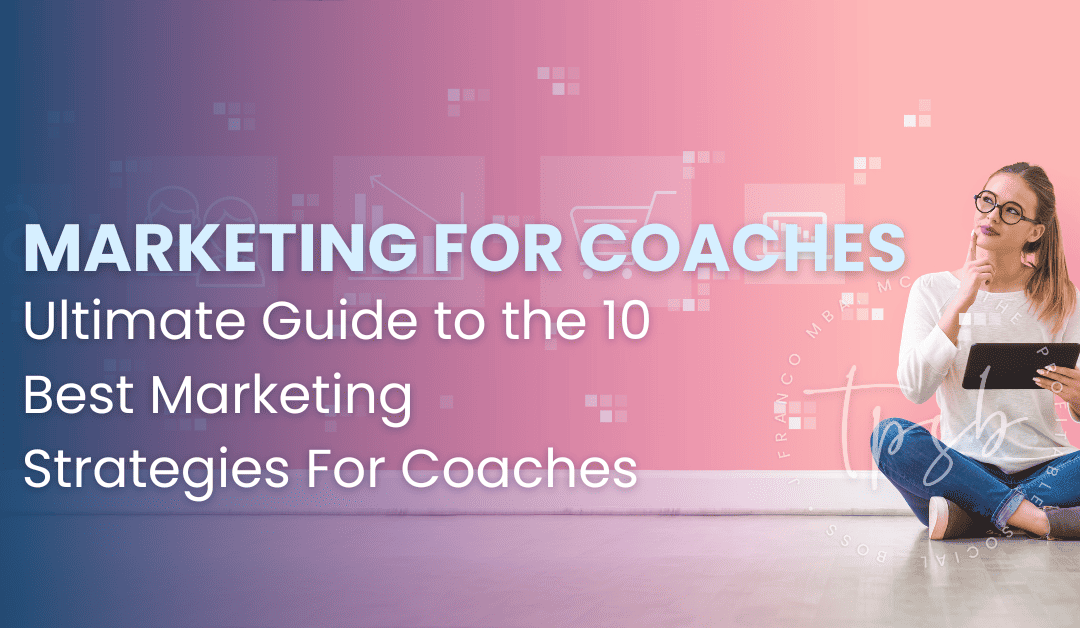Welcome to the ultimate guide to marketing for coaches in 2023! As a coach, finding the right marketing strategy for your personality and coaching packages is crucial to your success. When you make the right choices, you can achieve remarkable results without the constant hustle and grind. This comprehensive guide will explore various marketing strategies that can help you outrank your competitors and attract more clients to your coaching business. We will cover everything from referrals to content marketing, social media marketing to SEO. So let’s dive in!
10 Best Marketing Strategies For Coaches
1. Referrals: The Power of Word-of-Mouth Marketing
Referrals are often the first source of leads and clients for coaches. As a new coach, your network of friends, family, and colleagues undergoing the same certification can be a valuable source of referrals. However, preparing for the natural decline of these referrals is important as you exhaust your immediate network. To continue leveraging referrals, focus on delivering great results for your clients. When your clients are happy with your services, they are more likely to recommend you to others.
You can also establish a referral program from the beginning, offering incentives for clients to refer others to you. Consider providing a referral bonus or a special reward that aligns with your clients’ needs and preferences. Additionally, don’t hesitate to ask your satisfied clients for referrals directly. Clearly communicate the type of clients you’re looking for, and make it easy for your clients to refer others to you. Referrals are a powerful and cost-effective way to grow your coaching business.
2. Discovery Calls: Building Trust and Connection
The free discovery call is a staple in the marketing toolkit of coaches across various niches. Whether you’re a business coach, life coach, career coach, or health coach, offering a free discovery call can be a game-changer for attracting new clients. These calls, typically lasting 30 minutes to 1 hour, allow potential clients to understand how you work and how you can help them. It’s also an opportunity for you to assess whether the person is a good fit for your coaching services.
During the discovery call, provide value and demonstrate your expertise without giving away everything. While you want to showcase your abilities, it’s important to emphasize that the discovery call is just the beginning of a transformative coaching journey. Be clear about your unique value and how your coaching packages can provide long-term solutions. To streamline the process, create a well-crafted discovery call script that aligns with your coaching style and values.
To book discovery calls effectively, create a calendar link using tools like Calendly or OnceHub. Make sure this link is prominently displayed on your social media profiles and website. Including a strong call-to-action that encourages visitors to book a discovery call will increase your chances of attracting potential clients.
3. Content Marketing: Establishing Your Authority
Content marketing for coaches is a powerful strategy that helps you establish authority, build trust, and attract their target audience. In today’s content-driven world, becoming a content producer is essential for gaining visibility and recognition. Your content can take various forms, such as blog posts, videos, podcasts, and social media posts. You can position yourself as an expert by consistently creating valuable and relevant content.
Consider repurposing your core content across different platforms when implementing a content marketing strategy. Start by focusing on platforms that align with your strengths and preferences. If you dislike social media, prioritize visibility strategies like search engine optimization (SEO) and content creation. On the other hand, if you enjoy being in the spotlight and have excellent communication skills, video and social media platforms may be your ideal choices.
Remember, consistency is key in content marketing. Choose a format you enjoy creating, as it will be easier to maintain your content production over time. Consider your available resources and tailor your strategy accordingly. Starting with approaches that build your authority and attract discovery calls from the outset is essential for sustainable growth. Be mindful of picking effective and aligned strategies with your unique coaching business.

4. Social Media Marketing For Coaches: Building Your Online Presence
Social media marketing for coaches is crucial in growing your online business. It’s essential to be perceived as an expert and a valuable solution provider by your target audience. While it can be tempting to compare yourself to established coaches with large content teams, focusing on your own business and goals is important. Each coach’s marketing strategy should be tailored to their specific strengths and preferences.
Rather than imitating others, look inward and identify the marketing strategies that come naturally to you and resonate with your audience. Consistency is key, so choose platforms that you genuinely enjoy and can commit to consistently. Automating certain aspects of your social media marketing can also help you save time and streamline your efforts.
Remember that effective online marketing looks different for every coach. Align your marketing decisions with your business objectives and desired next steps. By staying true to yourself and your unique coaching business, you can attract the right audience and build a strong online presence.
5. Blogging: Positioning Yourself as an Expert
Blogging is a powerful tool for coaches to position themselves as experts in their field, build trust with their audience, and drive traffic to their websites. It offers several benefits, including:
Establishing your expertise: By consistently sharing valuable insights and knowledge through blog posts, you can showcase your expertise and attract potential clients.
Instant visibility: Blogging provides you with content that can be repurposed into multiple social media posts, expanding your reach and visibility.
Search engine visibility: Well-optimized blog posts can appear in search results when people seek coaching services. This can bring targeted traffic to your website and increase your chances of attracting potential clients.
When blogging, it’s important to write in a way that resonates with your audience. Use a conversational tone and share practical advice that addresses their pain points. Consider your target clients’ needs and preferences when choosing topics for your blog posts. Additionally, blogging is not limited to new coaches; it can benefit coaches at any stage of their business, including those who are pivoting or looking to attract organic leads.
6. SEO (Search Engine Optimization): Getting Found by Your Ideal Clients
Search Engine Optimization (SEO) is critical to any coach’s marketing strategy. While some coaches may think SEO is a technical and complex strategy, it can provide significant opportunities for those who leverage it effectively. Ranking high on search engine results pages (SERPs) can drive targeted organic traffic to your website and increase the chances of attracting potential clients.
To optimize your website for search engines, consider the following steps related to your coaching niche. Incorporate these keywords strategically in your website content, titles, and meta descriptions to increase your chances of ranking higher on SERPs.
- On-Page SEO: Make sure your web pages are optimized for relevant keywords. This includes title tags, meta descriptions, headers, and content.
- Technical SEO: This refers to improving the technical aspects of your website, like loading speed, mobile-friendliness, and security. It helps search engines crawl and index your website more efficiently.
- Local SEO: If you offer in-person coaching services in a specific geographic area, local SEO can help you attract local clients. Ensure your business is listed on Google My Business and optimize your website for local search keywords.
Remember that SEO is a long-term strategy. While you may not see immediate results, consistently implementing SEO strategies can significantly improve your website’s visibility and attract more organic traffic over time.
7. Email Marketing: Building Relationships and Retention
Email marketing is a powerful tool for coaches to build relationships with potential clients, nurture existing clients, and drive engagement. Regularly sending valuable content and exclusive offers to your email subscribers can build trust and keep your coaching services top-of-mind.
To effectively use email marketing, start by building an email list. Encourage website visitors to subscribe to your email newsletter by offering a free resource or incentive. Once you have an email list, create a regular email schedule and stick to it. Ensure each email provides value to your subscribers. This could be through tips, insights, success stories, or exclusive offers.
Remember, personalization is key in email marketing. Use your email marketing software to segment your list and send personalized emails to different subscriber groups based on their interests, needs, and interactions with your content.
8. Online Advertising: Reaching a Wider Audience
Paid online advertising can be a highly effective way to reach a wider audience and attract more clients to your coaching business. Platforms like Google Ads and social media ads allow you to target your ads to a specific audience based on their interests, behaviors, and demographics. This can help you reach potential clients actively seeking coaching services.
Before investing in online advertising, ensure your website and landing pages are optimized to convert visitors into leads or clients. Keep your ad copy compelling and clear, and use high-quality images or videos to catch people’s attention. Track your ad performance regularly and adjust your strategy based on the results to maximize your return on investment.
9. Creating a Community
Creating a community around your coaching business is an effective way to build relationships with potential clients, keep existing customers engaged, and increase referrals. Consider starting a blog or online forum related to your expertise and use it to provide helpful resources and advice. You can also host virtual events such as webinars or workshops for people interested in learning more about the topics you specialize in. Regularly engaging with your audience can foster a sense of trust and connection that will help grow your business.
10. Build Out Your Funnels
Your sales funnel is the process you use to convert visitors into customers. Build multiple funnels and optimize them with content, messaging, and ads so potential clients can learn about your coaching business differently. Ensure that each funnel contains a clear call-to-action (CTA) so people can contact you for more information or book an appointment. Make sure you are also tracking the performance of each funnel so that you can make adjustments and improvements accordingly.
In 2023, there are more ways to market your coaching business. Whether you’re a seasoned coach or just starting out, these strategies can help you grow your client base, establish your authority, and succeed in the competitive coaching industry.
Each approach provides unique benefits, from leveraging the power of referrals to implementing content marketing, social media marketing, blogging, SEO, email marketing, and online advertising.
Effective marketing for coaches is not about doing everything at once but choosing the strategies that best align with your business goals and resources. Now, it’s time to take action and start attracting more clients to your coaching business!

